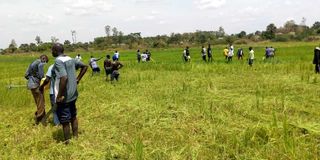Govt destroys 24 acres of rice in Lira wetland

Labourers hired by the Ministry of Water and Environment slash rice planted in Okole wetland, Lira City, on February 4. PHOTO | CHARITY AKULLO
What you need to know:
- The government in July 2021 banned the growing of rice and other crops in wetlands across the country. According to Ministry of Water and Environment statistics, Uganda has lost more than 30 percent of its wetlands in the last 23 years.Wetlands act as a natural filter for impurities that would have otherwise ended up in freshwater bodies
The government has destroyed more than 10 hectares (about 24.7 acres) of rice illegally planted in Okole wetland, Lira City, in a bid to restore the degraded ecosystem.
The crop, which was almost ready for harvest, was slashed down during an operation to crackdown on illegal activities in the protected ecosystem last week.
The operation was jointly conducted by the Environmental Protection Police Unit and officials from the Ministry of Water and Environment.
Mr Mbarak Muhindo, the officer-in-charge of enforcement at the Ministry of Water and Environment, explained that they resorted to cutting down the rice to discourage other people from cultivating in the wetlands.
He said enforcement is the last option since people have continued destroying wetlands with impunity.
“In June last year, we had a community engagement where people who were cultivating in Okole wetland signed an agreement with us, clearly stating that after harvesting their rice by December, they would be out of the place,” Mr Muhindo said.
“Surprisingly, when we made an inspection in mid-January this year, we found out that they are still continuing with the cultivation and that is when we mobilised ourselves, and we went on ground where we then cut down 10 hectares of the rice,” Mr Muhindo further explained.
The police said they found about 15 hectares of Okole wetland encroached on.
“We then arrested five people who were cultivating in the wetland though others took off. The ones we arrested were taken to Lira Central Police Station,” Mr Muhindo added. Mr Leonard Otike, the Lira City environment officer, said they are also planting papyrus to restore the degraded wetlands in the area.
“As we were doing the operation and cutting down the rice, there was also a team of people to trans-plant papyrus in the areas, which were heavily degraded. So, we hope it (wetland) will regenerate and catch up with the other areas,” he told this newspaper last Friday.
He appealed to the public to conserve the wetlands.
“It’s a known fact that degrading the wetland system and deforestation are things that destroy our environment and when our environment is compromised, people suffer in terms of extreme weather,” he explained.
The effects of extreme weather include floods, landslides, drought and wildfires.
Mr James Ogwang from Railways Quarters Cell in Lira City East Division is one of the affected farmers.
“It’s unfortunate that the poor people who cultivate rice are the ones targeted yet rich people are allowed to construct big buildings in the wetlands,” he said. President Museveni recently warned Ugandans against encroaching on wetlands, saying the government will cancel their titles.
“You will lose your money and we shall not compensate anyone. Your titles will be cancelled. Tampering with wetlands is not a good practice for our environment,” he said in a tweet on February 7, 2022.
The President also warned farmers against planting rice in the wetlands.
“You would rather do fish farming, which brings the same amount of money while saving the swamps and using the swamp grass for mulching your gardens,” he advised.




